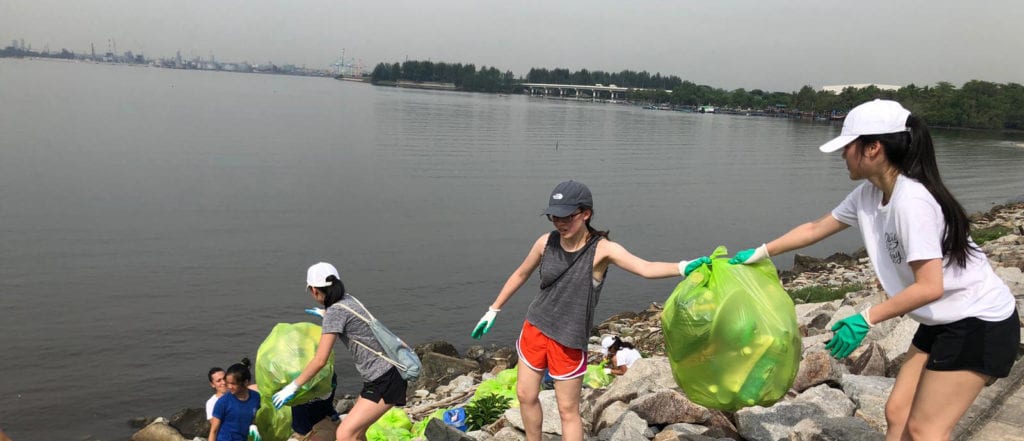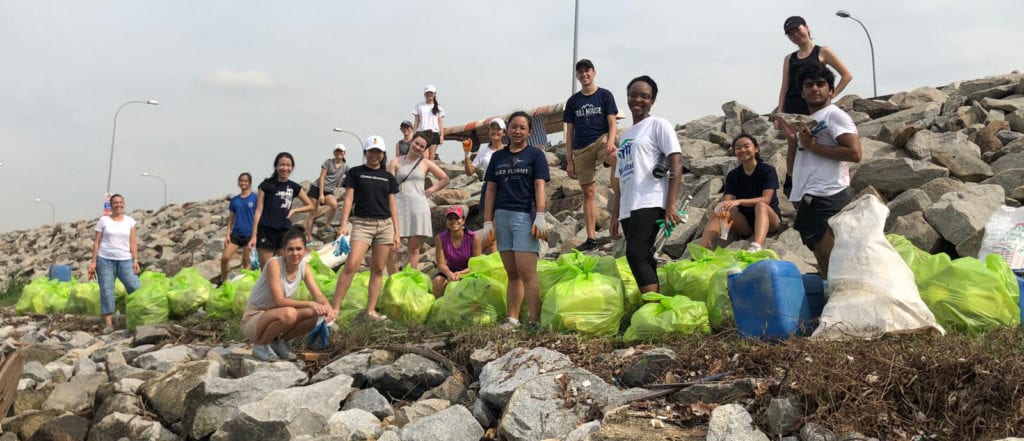Making a difference outside the classroom: Yale-NUS professor incorporates community service in her classes
 Yale-NUS students at Yishun Dam. Image provided by Asst Prof Valentina Zuin.
Yale-NUS students at Yishun Dam. Image provided by Asst Prof Valentina Zuin.
Late last semester, when most students were spending time indoors studying for their final examinations, a group of students were out in the sun picking up garbage along the Yishun Dam.
They were all taking a course called Water and Waste in Urban Environments taught by Assistant Professor of Practice in Social Sciences (Urban Studies) Valentina Zuin.
When she first started teaching this course at Yale-NUS College, Asst Prof Zuin found it difficult to get students to fully understand the issues being discussed in the classroom.
“Many of the issues we study – such as lack of access to basic services and housing, and absolute poverty – do not exist in Singapore, or they manifest themselves very differently. Singapore is the model of the world for water and sanitation and this is completely different from the places that we are studying, where people do not have toilets or water in their homes,” she said.
To help students better appreciate what they were studying, Asst Prof Zuin decided to organise fieldtrips in collaboration with a local environmental startup, Green Nudge.
After seeing these parts of Singapore that were heavily polluted with different types of trash, Asst Prof Zuin said that the students all came to the realisation that the issue is “not so distant anymore”.
“It was also a good moment to realise that it was not just others creating this problem but also ourselves. Some of the trash might have come from elsewhere but much of this trash are things that all of us use, such as plastic bottles or toothbrushes”,” she said.
For Adolfo Castro Dominguez (Class of 2021), participating in the Yishun Dam clean-up was enlightening because it “helped put into perspective the massive issue of waste disposal”.
“It also demonstrated how even in Singapore, which is deemed so clean, waste poses a massive environmental hazard,” he added.
 Image provided by Asst Prof Valentina Zuin.
Image provided by Asst Prof Valentina Zuin.
In addition to taking this course by Asst Prof Zuin, Adolfo was also enrolled in another course taught by her, Methods in the Social Sciences. For the latter, community service was similarly incorporated into the syllabus.
Working with Habitat for Humanity Singapore, Asst Prof Zuin designed the course so that students were not working on abstract ideas but a real community problem. Applying what they had learnt from the class, they were tasked with conducting participant-observation and interviews while cleaning the homes of underprivileged elderly people.
Their findings were then used to design a survey that was shared with Habitat for Humanity Singapore to carry out to better understand the needs and challenges faced by the beneficiaries.
For Thomas Lee (Class of 2020), it was particularly meaningful that the fieldwork was rooted in a real social problem that he could contribute to addressing.
“It was fulfilling to spend a few Saturdays helping the needy elderly residents with the clean-up process. Interacting with them had more takeaways than I thought, even though we may have experienced some communication barriers,” he said.
Immersing himself in the fieldwork also helped Thomas better understand how to employ what he had learnt in the classroom about research methods.
“When we piloted our survey with the residents, I realised how refined our survey questions were. This was possible only because we have become very familiar with what Habitat was doing, given that we have undergone similar experiences before.”
The course itself was also a pilot for Asst Prof Zuin, who wanted to examine whether incorporating a community service component to her courses makes a difference to her students’ learning experience.
“My feeling is that what we were saying in the classroom became very grounded in what was happening with their fieldwork. This was very powerful in discussing concepts because students really got them after they experienced what we discussed,” she said.
“For example, we had to do a lot of iterations of our data collection instruments to ensure we were capturing what we really needed, and because we had to go through that long and painful process as a class, the students realised what real research is about – steps forward, steps back, and continuous refinement of our thinking.”
To further examine this question, Asst Prof Zuin was awarded a Teaching Innovation Grant from the Yale-NUS Centre for Teaching & Learning to study how other liberal arts colleges incorporate experiential learning in their pedagogy. She will be traveling to several American colleges in September to learn from their faculty.
Thus far, the experience has been so impactful for Su Zhiying (Class of 2021) that she decided to change her major to Urban Studies after taking Asst Prof Zuin’s courses.
“After taking so many other courses that are largely theoretical, Asst Prof Zuin’s class on Water and Waste in Urban Environments was really a breath of fresh air that allowed me to take the theory that I had previously learned in other classes and apply them to the real world,” she said.
“The class really challenged me to reconsider some of the decisions I make on a daily basis. It also convinced me to become an Urban Studies major, because I love how truly interdisciplinary it is. It’s the perfect mix of theory and application, which I believe will really equip me with the required tools to go into policy-making or academic research.”
Adolfo similarly enjoyed how Asst Prof Zuin’s classes are rooted in real-world problems and issues.
“Learning theory in a vacuum is worthless if we don’t understand the ways in which it affects us and our context. Having had field trips or speakers come to talk about issues of global scale and what can be done to solve them has been a very insightful way of learning,” he said.
This semester, Asst Prof Zuin will be teaching Methods in the Social Sciences again, and another course called Cities of the Global South.





